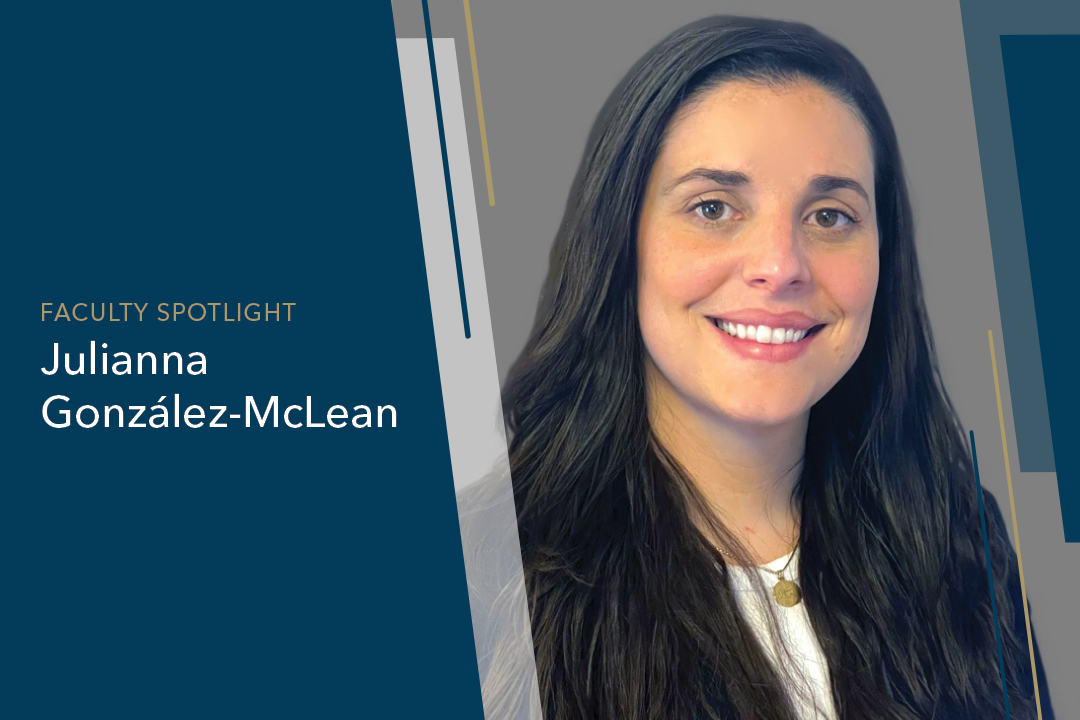Julianna González-McLean, GW Nursing’s new associate dean for diversity, equity and inclusion, draws on her personal experience in higher education to guide her current approach to supporting students from historically marginalized communities. “As an undergraduate I wanted to go to medical school to become a psychiatrist, but I quit pre-med after the Organic Chemistry course—I realized I wasn’t making any connections with the faculty,” she says. “I wasn’t getting any support, I just felt like I was in a sea of a bunch of students in 300 person classrooms.”
After graduating from Boston College with a bachelor of arts degree, González-McLean helped high school and international students navigate higher education. She found that her affinity for math and science and her own background as a non-native English speaker (she was born in San Juan, Puerto Rico) allowed her to counsel the international students more effectively. “I was able to translate the sciences and help students make sense of the information, and connect with them on how to interact with the courses like chemistry and biology in a playful way so that they can understand it a little better,” she says.
Prior to joining GW Nursing, González-McLean served as the assistant dean of Student Services, Diversity, and Inclusion at the Boston College Connell School of Nursing, where she helped create the Seacole Scholars Program, a living and learning community for students of color. She also created a scholars program for graduate students of color and a required diversity course for the nursing school’s Doctorate of Nursing practice program.
While developing those programs, González-McLean sought to answer the question, “How do we pedagogically support students of color, BIPOC (Black, Indigenous, and People of Color), first generation, English language learners, and under-resourced students?” she says.
Nurses can be the driving force for changing health inequities, González-McLean says, and she’s looking forward to working directly with GW Nursing students and faculty to update the curriculum to reflect the health care needs of all Americans.
“Nursing is the largest workforce in the health sciences in a hospital—nurses have such an influence in patients’ lives,” she says. “Even though the science is the science, we have to teach it in a certain way to understand why some groups are more prone to certain diseases than others, and to not just say ‘being Latinx or Black is a health predictor to getting a certain disease’ but instead ask, ‘what are the health inequities that lie underneath there, why is that the case?’”
González-McLean is familiar with the challenges that are inherent to creating systemic change. “We need to know how we partake in these systems of inequity—how we’re all players, we’re all embedded in it. It’s much bigger than just changing some words or having one workshop,” she says.
Americans who want to change the racism that has existed since the founding of the United States are battling a system that has worked effectively to exclude many individuals for hundreds of years. “Making change is going to take a long time, and we need to start with the individual level, while also looking at policies and systems at the same time,” González-McLean says. “Even though it seems like maybe we’re not doing enough, we’re fighting a big system that a lot of people don’t want to acknowledge exists, or don’t want it to be changed because it works for them.”
González-McLean is energized by the GW Nursing community who are ready to take real action to promote anti-racism and become renowned for inclusive excellence. “It’s not going to be overnight, but hopefully there can be small changes along the way and eventually we can get to a place where we feel really proud of the curriculum at GW Nursing in terms of diversity, equity, and inclusion,” she says. “We do the science really well, we teach nursing really well, but changing some pieces of it is going to take longer.“


